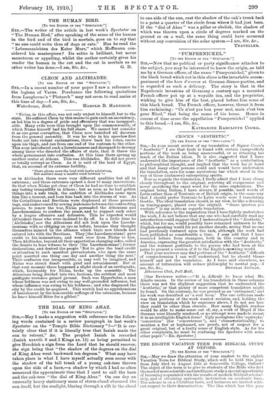CROCE'S "AESTHETIC."
[To THE EDITOR OF THE "SPECTATOR."] Sea,—In your recent review of my translation of Signor Croce's " Aesthetic " I see that fault is found with certain (unspecified) portions of the work as being unsuccessful, or as retaining too much of the Italian idiom. It is also suggested that I have underrated the importance of the "Aesthetic" as a contribution to philosophical thought, and implied that the work lay at hand and that many other persons could and would have undertaken the translation, save for some mysterious bar which stood in the way of those (unknown) enterprising spirits. Now as regards the translation, I freely admit that I have clung closely throughout to the original, rejecting all compromise and never sacrificing the exact word for the more euphonious. The original being Italian, I have always, if possible, used words of Latin rather than of Teutonic or of British origin, in the same way that I should prefer Teutonic to Latin words were I translating Goethe. The ideal translation should, in my view, be like a drawing on tracing-paper, placed over the original. " Otnas ignotum pro veritate " is my motto as regards translation.
With reference to the imputation that I have lightly undertaken the work, I do not believe that any one who had carefully read my introduction could suggest that I underestimated the " Aesthetic," which, but for me, would possibly have remained unknown to the English-speaking world for yet another decade, seeing that no one had previously ventured upon the task, although the work had been published so considerable a time. I may add that I have received letters from strangers, both in this country and in America, expressing the greatest satisfaction with the "Aesthetic," and the warmest gratitude to the person who had been at the pains to present a version of it to the English-speaking world. That your reviewer may find portions of the "Aesthetic " difficult of comprehension I can well understand, but he should blame himself and not the translator. As I have said elsewhere, no amount of trituration will reduce philosophy to mental pap.—I
Atheneum Club, Pall Mall.
[Our Reviewer writes :—"It is difficult to know what Mr. Ainslie means. In the review of his translation in these columns there was not the slightest suggestion that he underrated the
Aesthetic,' or that plenty of more competent translators might be found. On the contrary, he was praised as an enthusiast,' and his work was described as a real boon.' The one criticism made was that portions of the work wanted revision, and, holding the view on translation which he expresses above, I do not see how they could be other than obscure. How many English readers would be able to make sense out of, say, a work of Hegel if the German were literally rendered, or no attempt were made to recast it in an intelligible English form? Ugly neologisms like equivoke,' `concretion' (for concreteness '), and charaoteristicality; to mention a few at haphazard, are proofs, not of respect for a. great original, but of a faulty sense of English style. As for his other complaints, he must be confusing the Spectator with some other paper."—En. Spectator.]








































 Previous page
Previous page